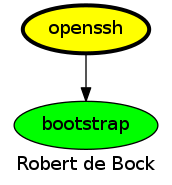openssh
Install and configure openssh on your system.
| Travis | GitHub | Quality | Downloads |
|---|---|---|---|
 |
 |
Example Playbook
This example is taken from molecule/resources/converge.yml and is tested on each push, pull request and release.
---
- name: Converge
hosts: all
become: yes
gather_facts: yes
roles:
- robertdebock.opensshThe machine may need to be prepared using molecule/resources/prepare.yml:
---
- name: Prepare
hosts: all
gather_facts: no
become: yes
roles:
- robertdebock.bootstrapFor verification molecule/resources/verify.yml run after the role has been applied.
---
- name: Verify
hosts: all
become: yes
gather_facts: yes
tasks:
- name: check if connection still works
ping:Also see a full explanation and example on how to use these roles.
Role Variables
These variables are set in defaults/main.yml:
---
# defaults file for openssh
# The tcp port ssh should listen on.
openssh_port: 22
openssh_address_family: any
openssh_listen_address:
- '0.0.0.0'
- '::'
openssh_host_key:
- /etc/ssh/ssh_host_rsa_key
- /etc/ssh/ssh_host_ecdsa_key
- /etc/ssh/ssh_host_ed25519_key
openssh_rekey_limit: default none
# openssh_syslog_facility can be AUTH or AUTHPRIV
openssh_syslog_facility: AUTHPRIV
openssh_loglevel: INFO
openssh_login_grace_time: 2m
openssh_permit_root_login: "yes"
openssh_scrict_modes: "yes"
openssh_max_auth_tries: 6
openssh_max_sessions: 10
openssh_pub_key_authentication: "yes"
openssh_authorized_key_file: .ssh/authorized_keys
openssh_authorized_prinicpals_file: none
openssh_authorized_keys_command: none
openssh_authorized_keys_command_user: nobody
openssh_host_based_authentication: "no"
openssh_ignore_user_known_hosts: "no"
openssh_ignore_rhosts: "yes"
openssh_permit_empty_passwords: "no"
openssh_password_authentication: "yes"
openssh_challenge_response_authentication: "no"
openssh_gssapi_authentication: "yes"
openssh_gssapi_cleanup_credentials: "no"
openssh_gssapi_strict_acceptor_check: "yes"
openssh_gssapi_key_exchange: "no"
openssh_gssaip_enable_k5_users: "no"
openssh_use_pam: "yes"
openssh_allow_agent_forwarding: "yes"
openssh_allow_tcp_forwarding: "yes"
openssh_gateway_ports: "no"
openssh_x11_forwarding: "yes"
openssh_x11_display_offset: 10
openssh_x11_use_localhost: "yes"
openssh_permit_tty: "yes"
openssh_print_motd: "no"
openssh_print_last_log: "yes"
openssh_tcp_keep_alive: "yes"
openssh_permit_user_environment: "no"
openssh_compression: delayed
openssh_client_alive_interval: 30
openssh_client_alive_count_max: 3
openssh_show_patch_level: "no"
openssh_use_dns: "no"
openssh_pid_file: /var/run/sshd.pid
openssh_max_startups: 10:30:100
openssh_permit_tunnel: "no"
openssh_chroot_directory: none
openssh_version_addendum: none
openssh_banner: none
openssh_accept_env:
- LANG
- LANGUAGE
- LC_ADDRESS
- LC_ALL
- LC_COLLATE
- LC_CTYPE
- LC_IDENTIFICATION
- LC_MEASUREMENT
- LC_MESSAGES
- LC_MONETARY
- LC_NAME
- LC_NUMERIC
- LC_PAPER
- LC_TELEPHONE
- LC_TIME
- XMODIFIERS
openssh_subsystem: sftp /usr/libexec/openssh/sftp-serverRequirements
- Access to a repository containing packages, likely on the internet.
- A recent version of Ansible. (Tests run on the current, previous and next release of Ansible.)
The following roles can be installed to ensure all requirements are met, using ansible-galaxy install -r requirements.yml:
---
- robertdebock.bootstrap
Context
This role is a part of many compatible roles. Have a look at the documentation of these roles for further information.
Here is an overview of related roles:

Compatibility
This role has been tested on these container images:
| container | tags |
|---|---|
| amazon | all |
| alpine | all |
| debian | all |
| el | 7, 8 |
| fedora | all |
| opensuse | all |
| ubuntu | bionic |
The minimum version of Ansible required is 2.8 but tests have been done to:
- The previous version, on version lower.
- The current version.
- The development version.
Testing
Unit tests are done on every commit, pull request, release and periodically.
If you find issues, please register them in GitHub
Testing is done using Tox and Molecule:
Tox tests multiple ansible versions. Molecule tests multiple distributions.
To test using the defaults (any installed ansible version, namespace: robertdebock, image: fedora, tag: latest):
molecule test
# Or select a specific image:
image=ubuntu molecule test
# Or select a specific image and a specific tag:
image="debian" tag="stable" tox
Or you can test multiple versions of Ansible, and select images:
Tox allows multiple versions of Ansible to be tested. To run the default (namespace: robertdebock, image: fedora, tag: latest) tests:
tox
# To run CentOS (namespace: `robertdebock`, tag: `latest`)
image="centos" tox
# Or customize more:
image="debian" tag="stable" tox
License
Apache-2.0